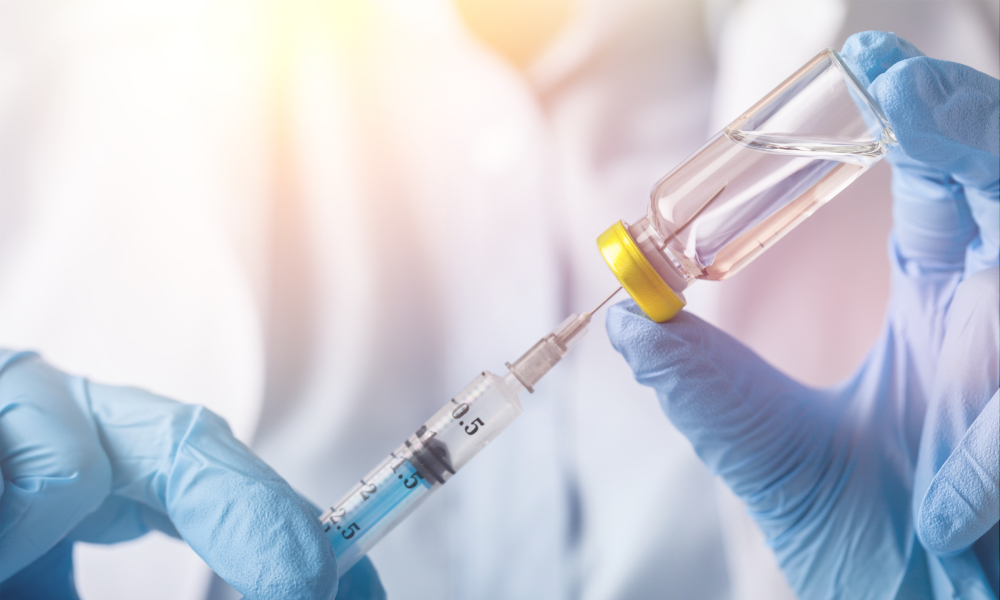In September 2019, Takeda Pharmaceutical Company Limited issued a drug recall of all doses of Natpara, a parathyroid hormone injection. The recall is due to safety concerns about rubber particulate contaminating the drug. While the focus of the medication recall is patient safety, the result is hardship for the more than 2,700 patients who rely on Natpara to manage symptoms of hypoparathoyroidism.
If you or someone you love has been diagnosed with hypoparathyroidism, you may find the following information helpful. As always, if you have questions about a drug recall, you can contact Drug and Device Watch to learn more.
What is Natpara?
Natpara is a prescription endogenous parathyroid hormone (PTH) that is used in conjunction with vitamin D and calcium to control low blood calcium levels. It is approved by the U.S. Food and Drug Administration (FDA) for use among adults with hypoparathoyroidism who do not respond well to traditional treatments. Natpara is a recombinant human protein containing the full length 84-amino-acid sequence.
Traditional treatment of hypoparathoyroidism is a combination of calcium and vitamin D. Oral medications like Calcitriol and Roacaltrol are used to maintain calcium levels, but many patients find them ineffective in adequately managing symptoms.
What is Hypoparathyroidism?
Hypoparathyroidism is a relatively rare condition where the body secretes abnormally low levels of the parathyroid hormone (PTH). This hormone is the key to regulating the body’s balance of calcium and phosphorus. When PTH is low, the body does not produce enough calcium to support bone health, but instead produces an over-abundance of phosphorus.
The symptoms of hypoparathyroidism include:
- Fatigue
- Weakness
- Muscle aches or cramps
- Tingling or burning in the toes, fingertips and lips
- Twitching or muscle spasms in the arms, hands, throat or lips
- Patchy hair loss
- Dry skin
- Brittle nails
Treating hypoparathyroidism generally includes a combination of medication and diet. Traditional treatment includes oral calcium and vitamin D supplements. Patients who do not respond well to traditional treatments may qualify for Natpara. These treatments are most effective when paired with a diet that is rich in calcium (leafy greens, broccoli and dairy) and low in phosphorus (avoid carbonated drinks, limit meat and hard cheese).
Hypoparathyroidism can lead to serious complications if it is not properly treated. Such complications may include:
- Seizures
- Cardiac irregularities
- Bronchospasm
- Respiratory failure
Traditional treatment with calcium and vitamin D is not effective for many patients. Furthermore, oral medications alone often have a negative impact on symptom management. For many patients, Natpara is nothing short of life-changing.
Information About Natpara Drug Recall
Takeda, the manufacturer of Natpara issued a recall after determining that repeated puncturing of the container’s septum could result in rubber fragments detaching into the cartridge. Natpara is distributed in a 14-day treatment period. During this time, patients puncture the septum with a needle before administering the injection. This repeated puncturing can compromise the integrity of the septum and cartridge.
Particulate matter entering the cartridge could potentially contaminate the medication. Because Natpara is an injection, particulates could enter the body and bloodstream. Particulate matter can result in:
- Vein irritation
- Phlebitis
- Pulmonary embolism
- Immune system dysfunction
- Pulmonary dysfunction
- Anaphylactic shock
- Death
All doses of Natpara are included in the drug recall, including 25, 50, 75 and 100 mcg doses. The FDA urges consumers who use Natpara to speak with their healthcare provider before discontinuing the medication. Patients can report adverse events to the FDA’s MedWatch Adverse Event Reporting program.
Natpara Drug Recall Causes Hardship for Patients
Patients who take Natpara may have a difficult time transitioning back to oral medication and traditional treatment. Many patients experience hypocalcemia, or extremely low levels of blood calcium. This can further lead to kidney function impairment and heart failure. Several patients also report experiencing chronic and debilitating muscle and bone pain after discontinuing Natpara.
There are reports that at least 100 patients have been hospitalized due to the negative effects of transitioning off Natpara back to traditional treatment. These patients suffered from a dramatic drop in calcium levels and required hospitalization and intravenous restoration of their calcium serum levels.
Patients who transition off Natpara due to the recall must follow a discontinuation plan with their healthcare provider. These patients should be monitored closely to ensure that calcium levels do not plummet to dangerously low levels. Patients must also receive education on the effects of coming off Natpara and what side effects they may experience.
Takeda Promises Updates to Patients
In reports, Takeda expresses compassion and regret about the Natpara drug recall. The manufacturer understands that patients who rely on the drug are experiencing hardship because of the recall. They promise to work with the FDA in resolving the possible defect as soon as possible. Takeda is also promising consumers that they will provide updates as often as possible in regard to remediation.
The head of Takeda’s US Hematology & Rare Business Unit, Cheryl Schwartz says,
“I want to reiterate that we do understand and sincerely regret the impact the Natpara recall is having on patients. We will provide another update as soon as we have more information to share. We continue to work around the clock to find ways to bring Natpara back to the broader hypoparathyroidism community,”
Healthcare providers who have questions or concerns about Natpara can contact Takeda Medical Information at 1-800-828-2088. Patients who have questions about the Natpara drug recall can contact OnePath by calling 1-866-888-0660.
Sources:
- https://www.medscape.com/viewarticle/921971#vp_1
- https://www.fda.gov/safety/recalls-market-withdrawals-safety-alerts/takeda-issues-us-recall-natparar-parathyroid-hormone-injection-due-potential-rubber-particulate
- https://www.mayoclinic.org/diseases-conditions/hypoparathyroidism/symptoms-causes/syc-20355375
